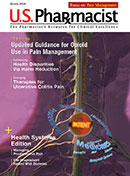US Pharm. 2013;38(7):1.
In the medical sense, Merriam-Webster’s Collegiate Dictionary defines stress as “a physical, chemical, or emotional factor that causes bodily or mental tension and may be a factor in disease causation.” For many pharmacists, stress is synonymous with the practice of pharmacy.
Over the many years I’ve been in publishing, I’ve received scores of comments from disgruntled pharmacists complaining about the stress levels they’ve had to endure while on the job. To be fair, the majority of grievances were from retail pharmacists who objected to everything from limited bathroom and meal breaks to understaffed pharmacy departments and unimaginable workloads. The list of complaints was seemingly endless.
According to a new survey by ComPsych Corporation, a company that provides employee assistance programs, stress is not limited to pharmacists. In fact, the survey revealed that “health care and hospital workers are more stressed than [those in] other industries.” Another interesting fact uncovered was that workers in the retail industry had the highest percentage of complaints “related to psychological disorders such as depression.” So it is easy to see why retail pharmacists exhibit the high stress levels they do.
While poor working conditions certainly contribute heavily to stress among pharmacists and other health care professionals and hospital workers included in the survey’s group of highest-ranking stressed-out employees, I do not believe that working conditions alone are a factor. I am certainly no psychologist, but I think blaming working conditions is only a manifestation of something much larger: the underlying stress that goes with the responsibility for other peoples’ lives that health care professionals carry with them every day they go to work. When it comes to pharmacists, the frustration of not practicing the profession the way they envisioned it before graduating from pharmacy school is likely to add to the mix of ingredients that lead to increased stress levels.
Yet don’t think for a minute that American pharmacists are unique when it comes to stress. Recently published research unveiled the fact that pharmacists in the United Kingdom are also riddled with stress, and that the problem there is getting worse. It has been called “a cancer in the profession” by Pharmacists’ Defence Association Director John Murphy. The U.K. survey showed that 69% of pharmacists surveyed experienced stress at, or as a result of, work in the past 12 months. This is a 2% increase from the previous year. And Australian researchers have plans to launch a survey in which they too hope to identify the levels of stress by pharmacists in that country.
Graduating pharmacists are faced with a dilemma. They strongly want to be an active participant in delivering much-needed health care to millions of patients, but they don’t necessarily want to do this in a work environment that is detrimental to their well-being. Retailers who hire these pharmacists must come to the realization that stress is real among pharmacists and may be harmful to their health. Pharmacists must be given the opportunity to practice their profession like any other health care professional…directly with the patient. Patients trust their pharmacist’s advice. Taking a more active consultative role in the pharmacy will elevate patients’ health, save this country billions in unnecessary health care costs, and eliminate needless stress in the pharmacy.
To comment on this article, contact editor@uspharmacist.com.






